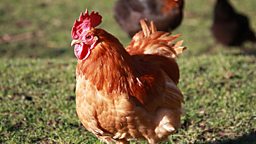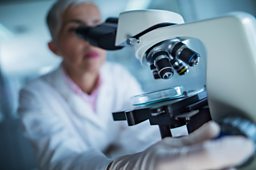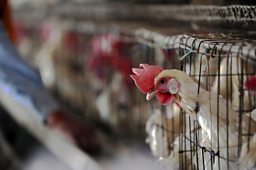Would you eat chicken grown in a lab?

A Californian company which creates cultured meat from a chicken cell in a laboratory has just become the first company in the world to get a licence to sell its chicken nuggets to consumers. So far they're only on sale in a restaurant in Singapore, but the company is looking for a licence here in the UK.
Speaking to 5 Live's Naga Munchetty, Eat Just's CEO Josh Tetrick said this is the first time people have “stuck their fork in chicken that didn’t require killing a chicken or tearing down a forest.”
How do you make chicken from a cell?

How do you make chicken from a cell?
A Californian company has been given a licence to sell 'cultured meat'.
Josh says the company takes a single cell from a chicken - this can be from a feather or a biopsy which doesn’t hurt the animal - feeds it with nutrients and manufactures the meat in a “clean, sanitary environment without any slaughter or chopping down a single tree.
“It’s entirely non-gmo, no genetic engineering… With one single cell you can make an unlimited amount of chicken, or beef or pork."
He says the chicken is grown in a factory that resembles a microbrewery with the end process being “literally chicken”.
“The nutritional composition of the chicken, the flavour of the chicken, it’s not plant-based chicken, it’s not vegan chicken, it literally is chicken but without all the issues that normally come with that.
“Minced chicken is phase one of this and then phase two will be more structured fat and muscle intertwined together in a more advanced structure.
“Then eventually we’ll be able to make three-dimensional steaks, three dimensional chicken breasts - any kind of meat you can imagine.”
What are the problems with normal chicken?

Josh says his lab-grown meat has no animal rights issues and is also better for the environment.
“67 billion chickens are slaughtered every single year and those 67 billion chickens are hungry. They eat a lot of soy and corn that is typically grown in areas where we have taken bulldozers to trees.
“About a third of our world isn’t forest, it’s fields of chicken and other animal feed, dedicated to feeding the animals we eat - that’s how we use our planet, it doesn't make a whole lot of sense.”
However researchers say meat grown in a lab may not necessarily be more environmentally friendly than meat from animals.
Who would eat lab-grown meat?

Josh says his girlfriend, who normally eats a plant-based diet, doesn’t think she would eat it.
“She tried the chicken nugget and the reaction she had was, ‘Wow, this is really animally! I don’t think I’m the person this is for.’
“I don’t think she is the kind of person this is for either… She hasn’t tried actual chicken for over ten years then she puts in her mouth and chews and the full chickenness comes right out.
“I’m a plant-based eater, plus our chicken - I’m not sure what that kind of eating’s called. We need a new name for it.”
The chicken is also currently quite pricey - a box of clean chicken bites costs around $23, significantly more than regular chicken nuggets.
Josh hopes to get the price “below the cost of even then cheapest chicken” in five to ten years.
“We’ve got to scale up, at the moment we’re only making 1000 litres so it’s relatively small. That’s another really important thing about this clearance in Singapore, there’s a reason to scale up… when you make a lot more, the cost comes down.”
What would happen to all the animals and farmers?

Josh says in a possible future world where all meat is grown in a lab, the vast majority of farm animals would be surplus to requirements.
“99.99% of them aren’t living in idyllic farms, sleeping under a starry sky, they’re in warehouses packed body to body and the next generation of those farm animals won’t need to be born and the need to feed all those animals won’t be there.”
But what would that mean for farmers? Josh says part of his vision is creating jobs “all over the place in this new industry”.
“Generally this is an entirely new industry, you’re going to get biochemists, molecular biologists, food scientists and chefs to participate in this.
“We think farmers have an important role to play - we partnered with a farm in Japan where they rear this high end kind of cow called Wagyu.
“We struck a deal with these farmers, when we eventually produce clean Wagyu meat, they get a percentage of the revenue that we make from it.”




